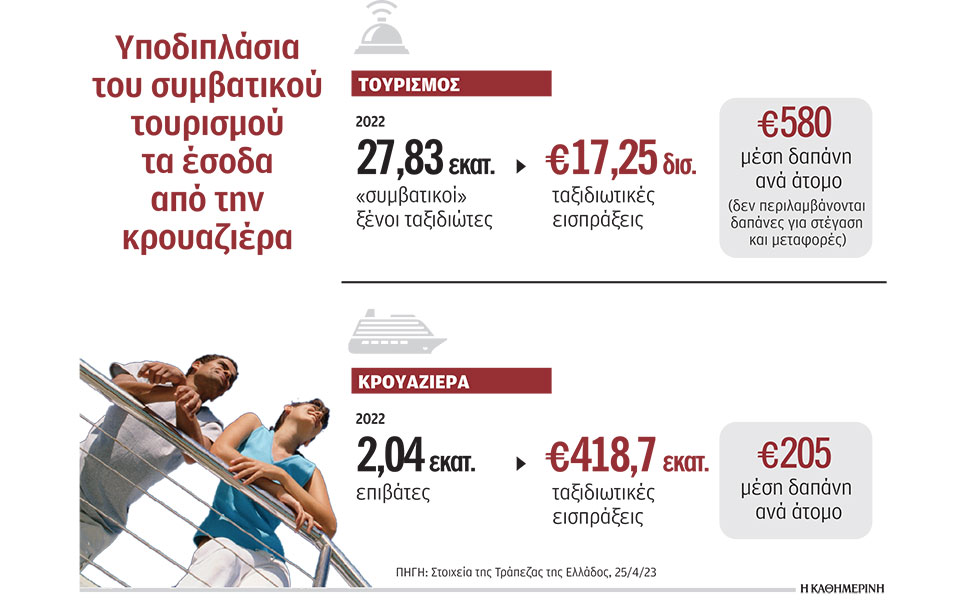
The list of selected Mediterraneans is growing, and not only maritime tourism destinations which impose increasingly severe restrictions on the approach cruise ships in their ports. Monaco has now joined cities like Venice, Barcelona and Dubrovnik in an attempt to stop the uncontrolled landing of thousands of people. tourists on a daily basis, which places a serious strain on infrastructure and the environment, leaving disproportionately small economic benefits. Marseille in France, Amsterdam in the Netherlands are also following the same path of introducing restrictions on cruises, and Barcelona is considering further tightening the restrictions.
Starting this year, Monaco will now only accept cruise ships that operate luxury cruises targeted at high value-added travelers, as long as they do not exceed 250 meters in length and their capacity does not exceed 1,250 passengers. In other words, it excludes all modern very large cruise ships that have been launched in recent years and are expected to increase in Mediterranean waters. At the same time, cruise activity in Greece remains largely unchecked, and even restrictions placed on congested destinations like Santorini are not enforced.
In particular, although Santorini has a daily drop-off limit of 8,000 passengers, a look at this year’s arrival schedule shows that, for example, on July 5, as on other days of this month, more than 9,000 passengers are expected. and even more so in August. At the same time, other ports such as Piraeus and Thessaloniki are preparing to receive even larger vessels, a typical example being the Piraeus Port Authority Passenger Port Expansion Project.
In early 2019, a year before the pandemic that temporarily halted the rapid growth of Mediterranean cruises, a report by the European Parliament’s Transport Committee (TRAN Committee) listed Santorini and other Greek destinations as Europe’s high risk areas for hypertourism and spoke of a change in character. and social fabric by the uncontrolled daily flow of tens of thousands of tourists.

Monaco, Venice, Barcelona, Dubrovnik, Marseille are imposing restrictions to stop the uncontrolled approach of cruise ships.
Pierfrancesco Vago, President of CLIA (Cruise Lines International Association) and Executive Chairman of MSC Cruises from Thessaloniki, where the 7th Posidonia Marine Tourism Forum is taking place these days, stated that “in 2021, the economic benefits for Greece exceeded 1 billion euros, with creating more than 15,000 jobs” and “the economic benefits of tourists arriving on Greek shores on cruise ships today are already higher than in 2019, which is partly due to the important work of local authorities”, since last year “87 CLIA cruise ships liners calling at Greek ports, 47, i.e. 54% had a port of embarkation (berthing) on Greek territory.”
But look at the data published just yesterday Bank of Greece, refutes the above claims: cruise passenger spending in 2021 was only 174.3 million, while even last year, when there was a significant recovery in activity, they reached 418.7 million, .Vago,” economists who follow the sector. And they add that according to a study conducted in Bergen, Norway, it was found that passengers disembarking there spend an average of no more than 23 euros. The income is too low to justify the pressure on the environment and water quality, transport infrastructure and waste management, air quality and, ultimately, the tourism product itself for ordinary travelers who choose to stay in these destinations and spend much more money, explain the same sources.

Greece ranks second in sales
The second most booked vacation this summer after Spain is Greece this season in both the UK and France. For the UK in particular, this follows from sales data released by Personal Travel Consultants (PTC) in collaboration with Blue Bay Travel. PTC said its total sales for the January-March period increased by 60% compared to the same period in 2019. Spain accounted for 11.5% of those bookings and Greece accounted for approximately 10% of its bookings in the first quarter. As for France, according to data for March from the Baromètre Orchestra L’Echo Touristique, which collects data on the sales of both traditional and online travel agencies, Greece is again in second place in sales after Spain, and these sales are indeed growing. high rates compared to previous months.
Source: Kathimerini
Lori Barajas is an accomplished journalist, known for her insightful and thought-provoking writing on economy. She currently works as a writer at 247 news reel. With a passion for understanding the economy, Lori’s writing delves deep into the financial issues that matter most, providing readers with a unique perspective on current events.